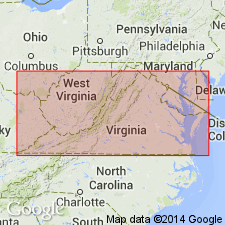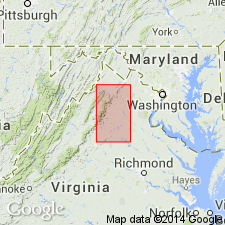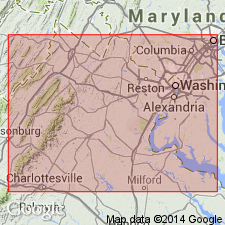
- Usage in publication:
-
- Arrington Mountain Alkali Feldspar Granite
- Modifications:
-
- First used
- Dominant lithology:
-
- Granite
- AAPG geologic province:
-
- Piedmont-Blue Ridge province
Summary:
Tollo and Arav (in press) propose that Robertson River Formation of Allen (1963) be revised as Robertson River Igneous Suite to emphasize the lithologic diversity that characterizes this belt. Rocks range in composition from alkali syenite to alkali feldspar granite to granite. This suite is the largest group of intrusives within the Blue Ridge province of VA. Extends from near Upperville, 70 mi southwest to northern suburbs of Charlottesville. Includes at least nine mappable lithologic units, among them, Arrington Mountain Alkali Feldspar Granite, which occurs in both segments of the Robertson River outcrop belt. Includes medium-grained, equigranular alkali feldspar granite with biotite +/-amphibole. Texturally and mineralogically consistent throughout. In contact with the Laurel Mills Granite. Unit has been traced for 11 mi toward the north from the eastern slope of Arrington Mountain and is the petrologic link between the northern and southern segments of the Robertson River outcrop belt.
Source: GNU records (USGS DDS-6; Reston GNULEX).

- Usage in publication:
-
- Arrington Mountain Alkali Feldspar Granite*
- Modifications:
-
- Named
- Dominant lithology:
-
- Granite
- AAPG geologic province:
-
- Piedmont-Blue Ridge province
Summary:
Recent detailed mapping and petrologic analysis indicate rocks previously assigned to Robertson River Formation include a series of granitoids, syenitoids, and felsites emplaced sequentially during 30 m.y. episode of magmatism. Collectively, the rocks form a dike-like mass of intrusions extending nearly 100 km from vicinity of Charlottesville, VA to north-northwest of Ashby Gap, VA. Therefore, name is revised to Robertson River Igneous Suite. At least 8 units of the suite are distinguishable by mineral composition, texture, bulk chemical composition, and U-Pb-determined isotopic age, and can be mapped at 1:24,000 scale. Arrington Mountain Alkali Feldspar Granite is named for Arrington Mountain. Type locality is large outcrop on west side of southernmost crest of Arrington Mountain adjacent to trail from VA Hwy 603, Brightwood 7.5-min quad, northern VA. Consists of gray, medium-grained, equigranular, biotite-bearing alkali feldspar granite characterized by typically prominent euhedral to subhedral mesoperthite grains. Contacts not exposed. Age is Late Proterozoic. Report includes geologic map.
Source: GNU records (USGS DDS-6; Reston GNULEX).

- Usage in publication:
-
- Arrington Mountain Alkali Feldspar Granite*
- Modifications:
-
- Geochronologic dating
- AAPG geologic province:
-
- Piedmont-Blue Ridge province
Summary:
U-Pb zircon age for Arrington Mountain Alkali Feldspar Granite is 730+/-4 Ma.
Source: GNU records (USGS DDS-6; Reston GNULEX).
For more information, please contact Nancy Stamm, Geologic Names Committee Secretary.
Asterisk (*) indicates published by U.S. Geological Survey authors.
"No current usage" (†) implies that a name has been abandoned or has fallen into disuse. Former usage and, if known, replacement name given in parentheses ( ).
Slash (/) indicates name conflicts with nomenclatural guidelines (CSN, 1933; ACSN, 1961, 1970; NACSN, 1983, 2005, 2021). May be explained within brackets ([ ]).

